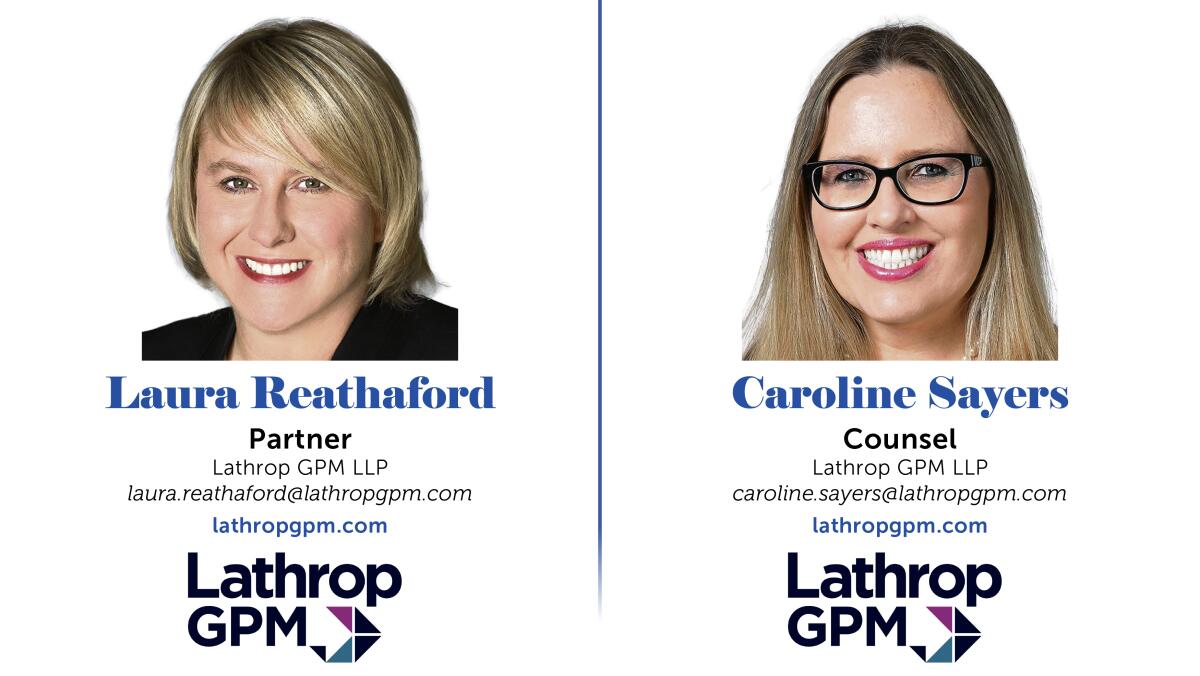Laura Reathaford and Caroline Sayers Give Insights on Labor & Employment Trends

The Labor & Employment Q&A section is produced by the L.A. Times B2B Publishing team in conjunction with Lathrop GPM LLP.
With the many unprecedented operational changes and adjustments that businesses in every sector have had to make over the last two years, a whole new landscape has emerged in terms of labor and employment issues. This has left even the most seasoned human resources and C-suiters struggling to find answers to crucial questions.
Are the changes that have emerged trend-driven or here to stay? What should management be focusing on in terms of new standards and laws pertaining to employee relations?
To address these issues and concerns, as well as many other topics pertaining to labor and employment hot buttons, the Los Angeles Times B2B Publishing team turned to two uniquely knowledgeable experts from Lathrop GPM LLP for their thoughts and the most important “need-to-know” insights and to get their assessments regarding the current state of labor legislation, the new rules of hiring and firing in the wake of the pandemic crisis, and the various trends that they have been observing in general.
Q: What were the most meaningful changes to labor and employment law and policy last year?


Laura Reathaford, Partner, and Caroline Sayers, Counsel, Lathrop GPM LLP: The provision of COVID supplemental sick pay was a significant change in employment policy. This law essentially shifted the burden from the government to California businesses to cover wages for employees by requiring the employer to provide up to 80 hours of paid leave to employees affected by COVID. On the federal level, limiting sexual harassment claims from arbitration agreements was also significant. On March 3, 2022, the Ending Forced Arbitration of Sexual Assault and Sexual Harassment Act of 2021 took effect. This law amends the Federal Arbitration Act (FAA) and prohibits employers from requiring employees to resolve sexual harassment and sexual assault claims through private arbitration unless the employee (after the claim arises) voluntarily chooses arbitration. As a result, even if the employee has previously signed an agreement to arbitrate employment law claims, the employee may now choose to pursue sexual harassment or sexual assault claims in court instead of arbitration.
Q: As we move deeper into 2022, what are the labor law hot issues to be aware of?
Reathaford & Sayers: There is a proposed ballot initiative that seeks to repeal California’s Private Attorneys General Act (“PAGA”) and replace it with a new law called the California Fair Pay and Employer Accountability Act of 2022. Since 2004, PAGA has appointed private litigants to step into the shoes of the Labor Commissioner and act as “Private Attorneys General” in order to collect civil penalties for purported violations of the California Labor Code. If a plaintiff is successful in recovering sums under PAGA, the employee receives 25% of the penalties collected, and the government receives the other 75%. In addition, plaintiffs’ attorneys can, and almost always do, receive their attorney’s fees in an amount that is generally 1/3 of the overall recovery. The proposed new law would effectively put the recovery of civil penalties back in the hands of the Labor Commissioner because, over the years, plaintiffs’ lawyers have been able to collect exorbitant fees, often for doing little more than filing a boilerplate lawsuit and attending a mediation. California lawmakers are also proposing a 32-hour, four-day workweek for private sector employers with more than 500 employees. This initiative is proposed and still many steps away from being passed. However, if passed, it could affect more than 2,000 California businesses.
“Millennials are now moving into management roles at many companies and have an opportunity to change company culture.”
— Reathaford & Sayers
Q: Do you think the labor shortage issues that have emerged over the last couple of years are temporary or is it a long-term challenge? Why?
Reathaford & Sayers: There is no easy answer to this question since the decision to return to work varies from person to person. That said, we are seeing an uptick in employment for several reasons: (1) employees have used up their savings during the “great resignation” period; (2) employees who attempted to start/create their own business during the pandemic have not been as successful as they would have liked; (3) government benefits have run out; (4) employers are paying higher wages; (5) employers are providing more flexibility regarding the availability of remote work; and (6) companies are learning how to manage COVID risks. For these reasons, we believe that the labor shortage is temporary.
Q: What is your advice to companies who want to implement mandatory vaccines for employees?
Reathaford & Sayers: As with any company policy, it is important for employers to communicate it effectively and apply it consistently. As we have seen, vaccinations are very controversial, and many employees have raised concerns based on religious and medical objections. When faced with these objections, employers should seek the advice of counsel to determine whether the objections have merit and/or can be accommodated.
Q: What trends are you seeing related to arbitration agreements in the employment context?
Reathaford & Sayers: In addition to the limitation of sexual harassment and sexual assault claims from arbitration agreements (discussed above), the United States Supreme Court is currently considering whether wage-and-hour claims brought under PAGA could be compelled to arbitration pursuant to a duly executed arbitration agreement. Since 2014, PAGA claims were immune from arbitration based on the California Supreme court’s decision in Iskanian v. CLS Transportation Los Angeles, LLC, 59 Cal. 4th 348 (2014). A decision on this issue is expected from the United States Supreme Court no later than July 2022. There is industry speculation that Congress may pass additional laws further limiting arbitration agreements beyond the sexual harassment and sexual assault claims to race-based discrimination and other employment claims.
Q: What effect does the increasing number of millennials have on a company’s approach to employee relations?
Reathaford & Sayers: Millennials are now moving into management roles at many companies and have an opportunity to change company culture. Millennials are known for valuing transparency, trusting employees to work - and be productive - from anywhere, and knowing that their company and what they do in it has a positive impact on the greater good. As managers, they will now have more influence over these values. Accordingly, companies must learn to embrace these values at the management level and not simply at the employee level.
“In these uncertain times, employers are relying more heavily on law firms that can provide advice and counseling services in order to avoid litigation before it begins.”
— Reathaford & Sayers
Q: What keeps you up at night?
Reathaford & Sayers: What keeps us up at night is the constant uncertainty employers face trying to manage employees in California. Anti-discrimination laws are changing on what seems to be an almost daily basis and are now targeting employee “bad behavior” instead of illegal discrimination. COVID-related disputes are starting to percolate and have created a tidal wave of litigation including, without limitation, the Labor Commissioner’s issuance of severe penalties for purported non-compliance with California’s COVID supplemental sick leave laws. Next, companies are struggling to balance a strong collaborative culture with remote work. Employees have become accustomed to working remotely and this has stalled the integration of newly hired employees. Finally, it appears that unions are enjoying a resurgence largely due to the fact that employees demand more flexibility and protection. According to an October 2021 Time magazine article, “Employees have been emboldened by a series of related events: soaring company profits, a renewed respect for essential workers and rekindled political will in Washington. Plus, there’s the hard truth of today’s labor market: Companies in many industries are finding employees downright impossible to replace.” All of these issues are creating an uncertain future for employers, making it harder for them to plan and manage their businesses.
Q: How does a law firm specializing in labor and employment differentiate itself from the competition in 2022?
Reathaford & Sayers: Lathrop GPM believes that it is imperative for employment lawyers to stay current with the ever-changing laws and trends, especially in the wake of the “me too movement,” COVID, and the new legislative hostility towards arbitration agreements in the employment context. Because of the constantly changing laws, it is also important for employment lawyers to embrace and provide employment counseling services. In these uncertain times, employers are relying more heavily on law firms that can provide advice and counseling services in order to avoid litigation before it begins. While the economics of law firm advice work may not seem lucrative at first blush, advice and counseling services are invaluable to clients. Thus, law firms can easily differentiate themselves by making employment advice and counseling work a priority. Finally, and in order to be an effective counselor, employment lawyers must have a profound understanding of their clients’ industries. In Lathrop GPM’s opinion, employment lawyers provide the most value when they are deeply entrenched in their clients’ businesses. This differentiator allows firms like us to predict areas of potential exposure and mitigate potential risks.